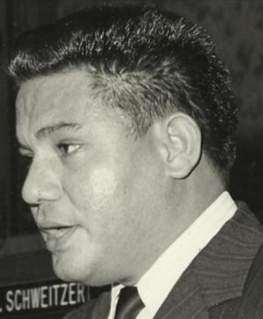Related Research Articles

Niue is an island country in the South Pacific Ocean, 2,400 kilometres (1,500 mi) northeast of New Zealand. Niue's land area is about 261 square kilometres (101 sq mi) and its population, predominantly Polynesian, was about 1,600 in 2016. Niue is located in a triangle between Tonga, Samoa, and the Cook Islands. It is 604 kilometers northeast of Tonga. The island is commonly referred to as "The Rock", which comes from the traditional name "Rock of Polynesia". Niue is one of the world's largest coral islands. The terrain of the island has two noticeable levels. The higher level is made up of a limestone cliff running along the coast, with a plateau in the centre of the island reaching approximately 60 metres above sea level. The lower level is a coastal terrace approximately 0.5 km wide and about 25–27 metres high, which slopes down and meets the sea in small cliffs. A coral reef surrounds the island, with the only major break in the reef being in the central western coast, close to the capital, Alofi.

Politics of Niue takes place in a framework of a parliamentary representative democratic dependency, whereby the Chief Minister is the head of government, and of a non-partisan system. Niue is self-governing in free association with New Zealand and is fully responsible for internal affairs. New Zealand retains some responsibility for external affairs, in consultation with Niue. The Niue Constitution Act 1974 (NZ) vests executive authority in Her Majesty the Queen in Right of New Zealand and the Governor-General of New Zealand. The constitution specifies that in everyday practice, it is exercised by a Cabinet of the Premier of Niue and three other ministers. The premier and ministers must be members of the Niue Assembly, the nation's legislative assembly. The Judiciary is independent of the executive and the legislature.
The Pacific Islands Chapter of the Internet Society (PICISOC) serves the Internet Society’s purposes by serving the interests of the global Internet community through its presence in the Pacific Islands. In addition to ISOC interests, PICISOC also focuses on local issues and developments, and acts as an impartial advisor to governments and the public on matters of significant interest to Pacific Island people concerning the Internet and ICT technology in general.

The Niue Assembly is the legislature of Niue. It consists of 20 members; 14 representatives of the villages and 6 elected on a common roll. Members are directly elected by universal suffrage, and serve a three-year term. Niue follows the Westminster system of government, with the Premier elected by the Assembly and the Cabinet drawn from it.

Sir Toke Tufukia Talagi was a Niuean politician, diplomat, and statesman. He served as Premier of Niue from 2008 to 2020.

General elections were held in the Cook Islands on 20 April 1965 to elect 22 MPs to the Cook Islands Legislative Assembly. The elections were won by the Cook Islands Party and saw Albert Henry become the Cook Islands' first Premier.
John David Tangi was a Cook Islands politician, MP, and Clerk of the Cook Islands Parliament. He was a member of the Democratic Party.

General elections were held in Niue on 9 April 1966.

General elections were held in Niue for the first time on 23 March 1960. A total of 39 candidates contested the 14 seats in the Assembly, with 2,118 voters registered. Voter turnout was 97%.
Glassie Davy George Strickland was Cook Islands missionary, businessman and politician. He served as a member of the Legislative Assembly between 1958 and 1961.

Dick Charles Brown was a Cook Islands businessman and politician. He served as a member of the Legislative Assembly between 1958 and 1965, and became the territory's first Leader of Government Business in 1963.

Robert Julian Dashwood was a British-born Cook Islands author and politician. He was a member of the Legislative Assembly between 1963 and 1966 and served in the territory's first two cabinets.
Leilua Pilia'e Iuliano was a Western Samoan politician. He was a member of the Legislative Assembly from 1957 until 1973.

Ngatupuna Matepi was a Cook Islands politician. He served as a member of the Legislative Assembly from 1958 until his death, had two spells in the cabinet between 1962 and 1965, and became the first official Leader of the Opposition in 1968.
Tiakana Numanga was a Cook Islands politician. He served as a member of the Legislative Assembly between 1965 and his death and held several ministerial portfolios, including being Deputy Premier.
Bwebwetake Areieta was an I-Kiribati politician. He served as a member of the Legislative Council and House of Assembly from 1971 until his death, also holding the posts of Member for Social Services and Minister of Communications, Works and Utilities during the 1970s.
Papa Raui Pokoati was a Cook Islands politician. He served as a member of the Legislative Assembly for his home island of Mitiaro between 1965 and 1978.

Tuatagaloa Tofa Siaosi was a Western Samoan politician. He served as a member of the Legislative Assembly from 1967 until 1973 and was Minister of Finance between 1970 and 1973.

Vainerere Tangatapoto was a Cook Islands chief, educator and politician. He served as member of the Legislative Assembly in two spells between 1958 and 1983.
Tuagatagaloa Patricia Rex, Lady Rex was a Niuean politician. The wife of Niue's first Premier Robert Rex, she was jointly one of the first women elected to the Niue Assembly. She also designed the flag of Niue.
References
- 1 2 3 "Tarzan the Ape Map" – who brings back fond memories Pacific Islands Monthly, May 1970, p85
- 1 2 Niue's loss Pacific Islands Monthly, December 1971, p117
- 1 2 Mr. A. Stickland Pacific Islands Monthly, October 1971, p132
- ↑ Niue Island Defers New Member System Pacific Islands Monthly, July 1966, p65
- ↑ Niue, Cooks Take New Steps Pacific Islands Monthly, October 1966, p15